Featured on Twitter | Controversy: BCH receives 12.5% miner tax to fund development, and V is opposed to calling this a mandatory soft fork
Foreword: Since the birth of Bitcoin, the decentralized nature of Bitcoin has made the source of development funds a problem. After Satoshi Nakamoto disappeared, Gavin Andresen, the successor appointed by Satoshi Nakamoto, encountered financial problems while maintaining the Bitcoin client, and initiated fundraising in the community. Under the circumstances that the funds raised were not enough to sustain development, Andresen turned For external help.
Then Andresen became a founding member of the Bitcoin Foundation, and regularly received a sum of money to Andresen, who was allocated to the developer who maintains the core client of Bitcoin. With the intervention of external funds and forces, the problem seemed to be solved.
Today, BCH, which was born on August 1, 2017, also encountered development funding problems. There were rumors that the original BCH foreign development team was funded by Wu Jihan / Bitmain, and the settlement of development funds was back in 2018. There has been discussion / controversy within the BCH community, and the "miner tax" proposal came into being. BTC came before, BSV approached, and now it's finally settled. Behind the "miner tax", is it a helpless move or just shooting yourself in the foot?
1. 12.5% of the BCH block reward is allocated to the development fund, leading to centralization disputes, and V God is against
CEO of BCH.TOP, the largest mining pool in BCH, Jiang Zhuoer issued a proposal through Medium, which will allocate 12.5% of the BCH block reward to the BCH development fund . The financing plan will last for 6 months and serve as the BCH ecosystem Provide important and much-needed support. A Hong Kong company has been set up to legally accept and allocate funds to cover development costs, covering full node implementation and other key infrastructure research and development . A blog post indicates that the plan will be implemented into BCH's May 2020 agreement upgrade . The fund will receive approximately 112.5 BCH per day for six months, for a total of approximately 20,588 BCH.
- Circle CEO: Asset tokenization will enter the mainstream in two to three years
- Value capture in the crypto world: who are the supercapturers?
- Science | Understanding Ethereum's P2P Network
If calculated at the price of 300 US dollars, the fund will receive a total of about 6.007 million US dollars . The proposal has already received support from other large mining pools at BCH, including Antpool, BTC.com, ViaBTC, and Bitcoin.com . These five pools account for 34.5% of the total BCH computing power. For miners who are unwilling to follow the plan, solitary block processing will be performed.
The article states that this was done to avoid the tragedy of the commons, and this is not a modification of the agreement, and miners can decide at any time not to continue this initiative . The article's endorsers are Jiang Zhuoer BTC.TOP, Wu Jihan Antpool & BTC.com, Yang Haipo ViaBTC, and Bitcoin Jesus Roger Ver Bitcoin.com.
Note: The full text of "BCH Infrastructure Financing Plan" released by Jiang Zhuoer on Medium:
https://medium.com/@jiangzhuoer/infrastructure-funding-plan-for-bitcoin-cash-131fdcd2412e
For the BCH proposal, ETH founder Vitalik Buterin tweeted several times that it was a mandatory soft fork and did not agree with the solution:
Subject: BCH performs a soft fork of a developer fund within a Zcash-style protocol.
I must admit that strange things have happened even less than a month after what Mark Lutter called "weird 2020".

12.5% of the overall reward of the BCH block was redirected from the miners to "a Hong Kong company". The article marks it as voluntary, but in reality, it is a mandatory soft fork .
[ 5. Orphan policy
In order to ensure the participation and subsidy of the entire SHA-256 mining algorithm pool, we will isolate those BCH blocks that are unwilling to follow the plan. This is necessary to avoid the tragedy of the commons. ]
It is worth mentioning that the irony here: BCH is a blockchain born in response to an ideology. This ideology believes that soft forks are the only reasonable way to make changes , because they are "voluntary behaviors." ". Now BCH will conduct a controversial soft fork and imply that this is "voluntary behavior".
[ d) This is not a protocol modification. It's a miner's decision on how to spend their block rewards and on which blocks to build. ]
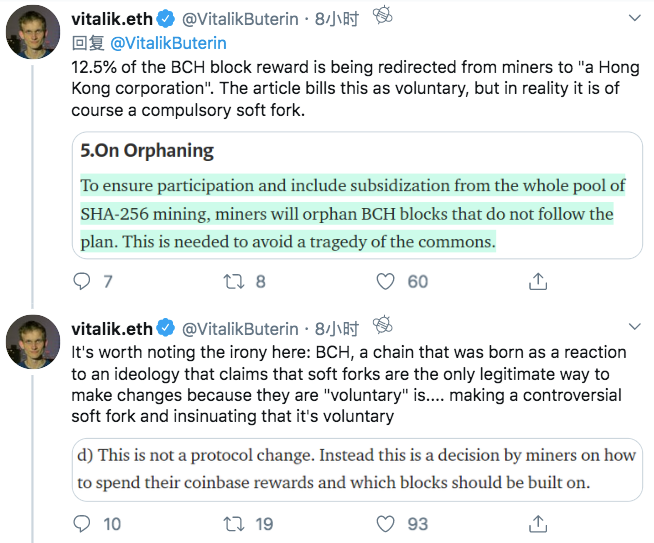
But at the same time, this can also be seen as a natural extension of today's BCH ideology , especially the "consensus market": https://medium.com/@Mengerian/the-market-for-consensus-203de92ed844#.y05ia7ee2

The idea here is that miners should propose different consensus rules and try to enforce them by forking non-compliant blocks, which will naturally stabilize towards consensus rules that are acceptable to most people.
This idea was first applied to the block size (this is what Bitcoin Unlimited does); * Apply * the idea to which 2 ^ 160 dimensional parameters of which addresses get which block reward shares to fund development?
I disagree with the idea of a market-for-consensus, because it has poor balance and can easily lead to entrenched interests . This group of miners seems to respect this concern (after all, BCH has also largely abandoned the consensus market on block size) and has made the fund time-constrained:
[The built-in developer financing mechanism (such as DASH coins) has both advantages and disadvantages. Some of the major differences in this program include:
a) There is no "master node" voting or any other form of voting. This is the decision of the miners to directly fund R & D.
b) this initiative will last for 6 months (May 15, 2020 to November 15, 2020)]

Having said that, what I highly praise is that cryptopunk takes the challenge of public goods seriously. Like everyone else, I have more and more discussions on this topic: https://medium.com/ethereum-optimism/optimism-cd9bea61a3ee

The main challenge now is governance . The problem of public goods is not a temporary emergency, but a system problem that requires a systematic solution. This requires credible and neutral governance that people can accept for a long time. https://nakamoto.com/credible-neutrality/

I am certainly bullish on quadratic financing; this is my review of the third round of gitcoin Grants QF, and the review of the fourth round is coming soon! https://vitalik.ca/general/2019/10/24/gitcoin.html
(Postscript disclaimer: I don't know the structure of this "Hong Kong company" or who will donate it to. I have a lot of uncertainty about the extent to which this funding really provides funding for necessary development. Governance is important.)
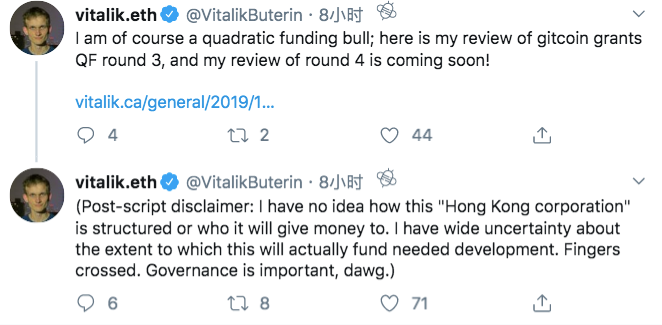
BitMEX Research agrees with BCH's approach, and uses Burger King to close the store as an analogy:
From a security perspective, it is a good idea for BCH miners to donate 12.5% of the block reward to the developer fund, which will be implemented after the Bitcoin block reward is halved. Although only 3 days from the expected date.

It's a bit like Burger King said they plan to close 12.5% of their stores, but McDonald's workers will bear most of the cost because wages will be depressed. This is correct in some ways, but the point is that there are fewer Burger King stores.

Cryptocurrency analyst WhalePanda sees this as centralized totalitarianism:
It is ridiculous to implement a 12.5% miner's tax on $ BCH, and anyone who does not donate will be treated as an orphan.
This is the centralized totalitarian regime, with a 51% threat of attack.
"A Hong Kong company has been set up to legally accept and allocate funds"

Nic Carter, founder of blockchain analytics company Coinmetrics, points directly to the centralization of BCH:
This is the so-called "pick off the centralized veil".

Bitcoin Lightning web developer Alex Bosworth's view is relatively negative, mentioning the threat of 51% attacks, and not optimistic about BCH after:
Fork currency operators are coming up with some novel business models to replace them to speed up the mining rewards.
Because they are fully centralized blockchains, they can easily create conspiracy groups to steal block rewards, or steal coins controlled by Satoshi Nakamoto through a hard fork.
A censorship tax on PoW is a way to cover up a 51% attack that doubles the mining rewards of the conspiracy group. Since the group can charge the taxes and fees on electricity, the corresponding difficulty adjustment means that they are the only people who can economically dig blocks.
Since checkpoints are used to fork currencies instead of PoW, why should there be a PoW subsidy? With the "Developer Fund" you can imagine more failures. A "community fund" for people who work hard to produce Minion meme. An "SEO Fund" to pay for Twitter Twitter names and domain names.
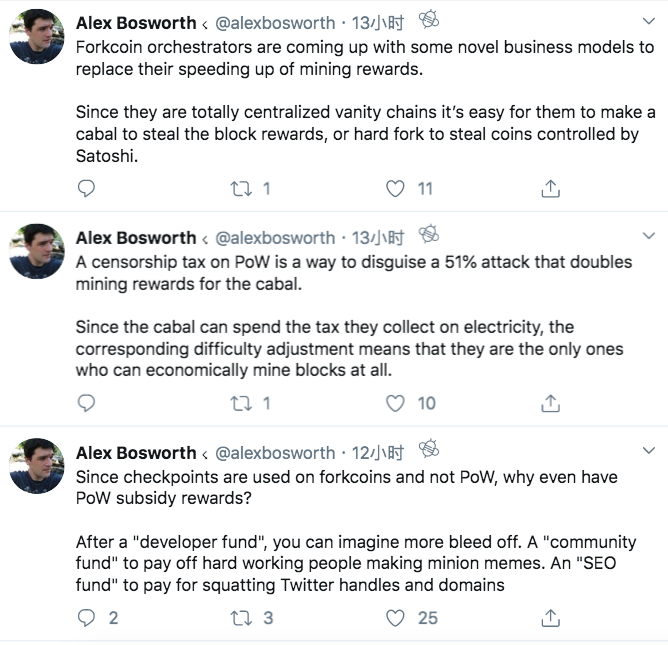
BSV goldman and billionaire Calvin Ayre believes this will anger anti-tax supporters:
I have talked with several lawyers and they said that increasing the miner tax on BCH will turn the tokens into unlicensed securities. This will disrupt BCH's business model as a criminal currency and anger all anti-tax supporters who support them. This behavior belongs to shooting yourself in the foot.

2. Naolong? Davos Forum advertises Satoshi Nakamoto
Coindesk author Nathaniel Whittemore tweeted with pictures, and the photo shows that Credit Suisse, the world's famous financial institution, appeared to have advertised Satoshi Nakamoto on the World Economic Forum-Davos Forum.
Ten years ago, who would have thought that Credit Suisse would buy "Satoshi" ads at the world's most famous economic event?
Note: The ad is "Satoshi, welcome to Davos."

Nathaniel Whittemore then stated that the photo was from former Coinbase CTO Balaji S. Srinivasan, and Srinivasan himself clarified that the photo came from a few years ago:
This is just an interesting meme, but it was a few years ago. I'm not sure if it actually references Satoshi Nakamoto or a Japanese policy maker who is also called Satoshi. But in any case, things are good in themselves.
Note: In Japanese, it is also pronounced as the name of Satoshi, and there are many different Chinese wordings besides "Satoshi".
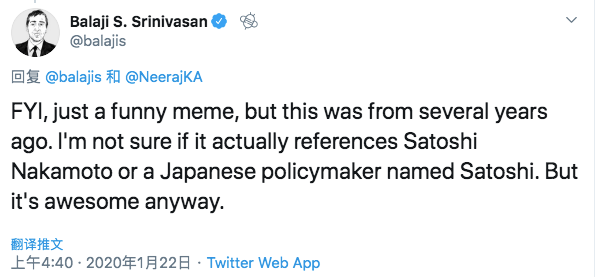
Credit Suisse, the party involved in the incident, mentioned in its 2018 report that World Economic Forum survey data shows that more than half of people of insight believe that blockchain will account for 10% of global GDP by 2025, and pointed out that 2025 will be a bit Maturity of the coin.
As a world-renowned economic forum, the participants in the Davos forum include leaders from various countries, well-known bankers and financial professionals. Although the ad happened a few years ago, there are many people in the cryptocurrency community in the Davos Forum currently underway, reflecting the increasing global interest in cryptocurrencies and blockchain. According to Coindesk's report entitled "An Coming War of Monitored and Private Currency", the participants' interest in blockchain technology was very obvious. Fiat digital currency is one of the hot spots. China's central bank digital currency DC / EP is expected, and the Thai central bank said that it has made progress on the central bank's digital currency project. In addition, most experts at the Davos Forum seem to agree that blockchain technology should be used for more data collection than for sovereign finance.
3. Ray Dalio, founder of Bridgewater Fund: Cash is rubbish. Stay away from Bitcoin
Billionaire Ray Dalio, founder of Bridgewater Associates, one of the world's largest hedge funds, warned people on the CNBC show at the World Economic Forum in Davos to stay away from more speculative currencies, such as Bitcoin. Ray Dalio stated:
"Currency has two purposes, one is the medium of exchange , and the other is the store of wealth , and Bitcoin is invalid in both cases ."

Ray Dalio believes that Bitcoin is too volatile to be used as a store of value, and then recommends a small share of investment gold.
"Due to volatility, you cannot approach it. Maybe one day, Libra or something with more stable value has greater potential. But again, who will buy it? The central bank and others? What will they use as reserves? ? "

Ray Dalio also believes that " cash is junk" and warns investors not to sell stocks for US dollars.
For Ray Dalio's statement, Coinshare CSO Meltem Demirors commented:
Behind the title are always more exciting stories.
Title: Ray Dalio Talks Bitcoin and Gold in Davos, "Cash Is Trash"
Story: In the same year, Standard & Poor's yield reached 25%, while Bridgewater Fund only had 0.5%
Bonus story: Ray sold 2 million books up to 600 pages, including children's editions.
Note: Ray Dalio is known to readers in China because of the book Principles.
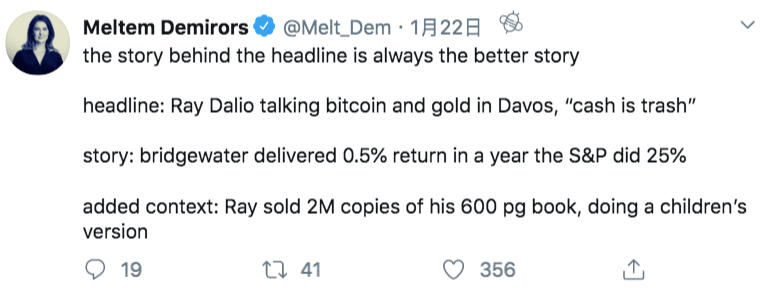
4.Bitcoin is becoming more decentralized
Trader Rhythm tweeted that Bitcoin is becoming more decentralized:
Since last year, addresses holding one or more bitcoins have grown by almost 11%, from a total of 707,000 to 784,000.
This number has more than doubled since the beginning of 2015.
Bitcoin has become increasingly decentralized.

The above data comes from Glassnode. Connor Abendschein, a crypto research analyst at Digital Assets Data, said: "Stable growth is the result of the accumulation of retail buyers.
In addition, there are also opinions that the growth of addresses may also come from exchanges and large players called "whales", although such addresses usually have a large balance and usually rank first in the Bitcoin "Rich List". There are the most bitcoin address tables.
5. Industry News
a. A Reddit post states that, due to poor economic conditions, Venezuelans are selling the national digital currency petroleum currency (PTR) obtained by airdrop on LocalBitcoins at 50% (US $ 30) of the government's original price of US $ 60.
b. Twitter CEO Jack Dorsey's payment company Square has obtained a patent for real-time settlement network of fiat / digital currency, which allows users to freely choose the sending / receiving currency when making settlements.
c. Pornhub, the world's largest adult video website, chose USDT as one of its wage payment methods. The reason is that at the end of 2019, PayPal terminated the service contract with Pornhub on the grounds of "violating the PayPal use regulations policy". USDT will be paid via TRONlink wallet.
d. Ripple released the latest XRP report, which showed that Q4 sales decreased by 80% year-on-year to $ 13.08 million, and Q3's figure was $ 66.24 million.
e.The Block report pointed out that although Chinese users are more concerned about reputation and practicality than decentralization when choosing a financial service provider, users are increasingly interested in DeFi, and traffic from China accounts for 10% of MakerDAO's total traffic.
f. Bakkt President Adam White announced at the Davos Forum that Bakkt consumer applications will be launched in 2020. The app is likely to support cryptocurrency, stocks, and loyalty reward points.
g.Messari reports that asset management company Grayscale has announced that it will continue to fund ETC development activities over the next two years. Since 2017, Grayscale has donated one third of its ETC trust fund management fee (3% of the asset management scale) and is now worth $ 1 million to the non-profit organization ETC Cooperative.
Disclaimer: The opinions of institutions and people in the text do not represent the position of The Block Hub and do not constitute investment advice.
We will continue to update Blocking; if you have any questions or suggestions, please contact us!
Was this article helpful?
93 out of 132 found this helpful
Related articles
- State Street Bank: Focusing on 5 Important Trends in Digital Asset Development
- Digital currency ambitions unveiled in Europe: seize opportunities and guard against opponents
- Views | What are the prominent issues facing blockchain judicial applications? The authenticity of the on-chain data resource itself
- Opinion | 2020, which real use cases will drive the rapid development of the cryptocurrency field
- Why is the "DAO + ICO" fundraising method proposed by Vitalik not working?
- People's Posts and Telegraphs: Six possibilities for blockchain development in 2020
- Davos News | Ten-year journey, China Blockchain Industry Figure Contribution Awards announced






